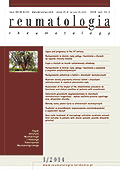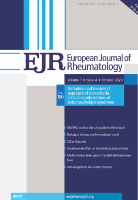
Advances in Rheumatology
Scope & Guideline
Unlocking the potential of rheumatology through open access.
Introduction
Aims and Scopes
- Clinical Research and Trials:
The journal emphasizes clinical studies, including randomized controlled trials and observational studies, aimed at evaluating treatment efficacy and safety in various rheumatic conditions. - Biomarkers and Pathophysiology:
Research on biomarkers for disease diagnosis and prognosis, as well as studies investigating the underlying mechanisms of rheumatic diseases, are core areas of focus. - Patient-Centered Outcomes:
There is a significant emphasis on understanding patient perspectives, quality of life, and psychosocial factors affecting those with rheumatic diseases. - Guidelines and Consensus Statements:
The journal often publishes consensus statements and clinical guidelines developed by expert groups, particularly the Brazilian Society of Rheumatology, to standardize care practices. - Innovative Therapies:
Research on new therapeutic approaches, including biological and targeted synthetic drugs, as well as alternative therapies, is a critical aspect of the journal's scope. - Epidemiology and Public Health:
Studies assessing the prevalence, risk factors, and outcomes of rheumatic diseases within specific populations, particularly in Brazil and Latin America, are prominently featured.
Trending and Emerging
- Patient-Centered Research:
There is a growing focus on studies that assess patient-reported outcomes, experiences, and quality of life, highlighting the importance of patient perspectives in treatment efficacy. - Biological and Targeted Therapies:
Research on biological agents and targeted synthetic drugs, including their long-term effects and comparative effectiveness, is increasingly prominent as these therapies become standard in management. - Genetic and Biomolecular Studies:
Emerging studies exploring genetic predispositions, biomarkers, and molecular pathways related to rheumatic diseases are gaining traction, reflecting advancements in precision medicine. - Impact of Comorbidities:
Research examining the interplay between rheumatic diseases and comorbid conditions, such as cardiovascular disease and metabolic disorders, is becoming more prevalent, emphasizing holistic patient care. - Digital Health and Telemedicine:
The COVID-19 pandemic has accelerated research into telemedicine and digital health tools for managing rheumatic diseases, highlighting their effectiveness and patient acceptance. - Environmental and Lifestyle Factors:
An increasing number of studies are addressing how environmental factors, diet, and lifestyle choices influence the onset and progression of rheumatic diseases, reflecting a broader understanding of disease etiology.
Declining or Waning
- Traditional Therapeutics:
Research focused solely on traditional therapeutics, such as non-steroidal anti-inflammatory drugs (NSAIDs) without new insights or comparative studies, appears to be decreasing as more attention shifts towards innovative and targeted therapies. - Rare Autoimmune Disorders:
Although still important, the frequency of studies on less common autoimmune disorders, such as certain forms of vasculitis or rare connective tissue diseases, has diminished compared to more prevalent conditions like rheumatoid arthritis and lupus. - Longitudinal Cohort Studies:
While cohort studies remain relevant, there seems to be a decline in the number of large-scale longitudinal studies assessing the long-term outcomes of rheumatic diseases, possibly due to resource allocation to more immediate clinical trials. - Basic Science Research:
There is a noticeable reduction in basic science studies focusing on molecular mechanisms of disease outside the context of translational research, as clinical applicability becomes a priority. - Historical and Epidemiological Reviews:
The prevalence of comprehensive historical or purely epidemiological review articles has waned, with a preference for studies that directly impact clinical practice and patient management.
Similar Journals

Lupus Science & Medicine
Pioneering insights into lupus and autoimmune diseases.Lupus Science & Medicine is a leading open-access journal published by the BMJ Publishing Group, dedicated to advancing the understanding and treatment of lupus and related autoimmune diseases. Since its establishment in 2014, the journal has fostered an academic environment for researchers, healthcare professionals, and students, providing a platform for high-quality, evidence-based studies. With a notable impact in the fields of immunology and rheumatology, it currently holds a Q1 ranking in Rheumatology and Medicine (miscellaneous) and Q2 in Immunology, reflecting its significant contribution to these vital areas of medical research. The journal is indexed in Scopus, with a commendable rank in the 67th percentile for Rheumatology, making it a valuable resource for those seeking the latest insights into lupus management and treatment. The journal emphasizes the importance of open access, ensuring that research findings are widely available to enhance global knowledge and collaboration in the fight against lupus.

CLINICAL AND EXPERIMENTAL RHEUMATOLOGY
Connecting research and clinical excellence.CLINICAL AND EXPERIMENTAL RHEUMATOLOGY is a prestigious journal published by CLINICAL & EXPER RHEUMATOLOGY, dedicated to advancing the field of rheumatology and immunology. With a rich history dating back to 1983, the journal serves as a critical platform for researchers, clinicians, and professionals seeking to disseminate and discuss innovative findings in these rapidly evolving areas. Featuring an impressive Q2 ranking in both Immunology and Allergy, as well as Rheumatology, this journal is recognized for its high-quality contributions, placing it among the top tier of academic publications. Operating without an open access model, CLINICAL AND EXPERIMENTAL RHEUMATOLOGY is headquartered in Pisa, Italy, and publishes articles that undergo rigorous peer review to ensure excellence in research. This journal is an invaluable resource for those dedicated to improving patient outcomes through evidence-based practice in rheumatology, immunology, and related fields.

Reumatologia
Enhancing visibility of crucial research in Rheumatology.Reumatologia is a dedicated open-access journal published by TERMEDIA PUBLISHING HOUSE LTD that has been serving the global scientific community since 2005. The journal focuses on the fields of Rheumatology, Immunology, and Allergy, providing a rich platform for researchers and practitioners to share innovative findings, clinical insights, and methodologies. With its roots tracing back to the early 1960s and a steady convergence of quality content through 2024, Reumatologia has secured a place in the academic landscape, currently holding a Q4 rating in Immunology and a Q3 rating in both Immunology and Allergy and Rheumatology categories for 2023. While the journal ranks #42 out of 73 in the Medicine - Rheumatology category, its open-access model ensures that research is widely disseminated, enhancing visibility and accessibility to vital knowledge that shapes therapeutic practices. Located in Poznan, Poland, Reumatologia remains a pivotal source of credible research, fostering collaboration among academics, healthcare professionals, and students internationally.

SCANDINAVIAN JOURNAL OF RHEUMATOLOGY
Exploring New Horizons in Rheumatology ScienceThe Scandinavian Journal of Rheumatology, published by Taylor & Francis Ltd, is a prestigious peer-reviewed journal dedicated to advancing research in the fields of rheumatology, immunology, and related disciplines. With an ISSN of 0300-9742 and an E-ISSN of 1502-7732, this journal has established itself as a vital platform for disseminating significant findings and innovative approaches in the management of rheumatic diseases since its inception in 1959. As a recognized scholarly outlet, it currently resides within the Q2 category for Medicine (miscellaneous) and ranks #39 out of 73 in Rheumatology according to the 2023 Scopus assessments. This reflects the journal's commitment to high-quality research and its relevance in the scientific community. Although it does not provide Open Access options, the journal's rigorous selection process ensures that only the most impactful research reaches its audience, making it a crucial resource for researchers, clinicians, and students engaged in the exploration of rheumatological and immunological challenges. The journal's broad scope encompasses ongoing studies, clinical trials, and reviews that aim to enhance understanding and treatment of rheumatic conditions, promoting collaboration and knowledge-sharing among professionals in the field.

Rheumatology Advances in Practice
Advancing knowledge, enhancing care in rheumatology.Rheumatology Advances in Practice, published by Oxford University Press, is a vital open-access journal dedicated to advancing research and education in the field of rheumatology. With an E-ISSN of 2514-1775 and an impressive open access model established since 2017, this journal facilitates the dissemination of cutting-edge knowledge and innovative practices to a global audience. It has garnered recognition within the academic community, holding a Q3 classification in Rheumatology for 2023, which reflects its contribution to the evolving landscape of rheumatological research. The journal aims to present high-quality, peer-reviewed articles that explore the latest findings, advancements, and clinical applications in rheumatology, making it an essential resource for researchers, healthcare professionals, and students alike. By bridging the gap between research and practice, Rheumatology Advances in Practice plays a significant role in improving the care of patients with rheumatological conditions, promoting evidence-based approaches to clinical challenges.

Current Treatment Options in Rheumatology
Elevating standards of care with timely research in rheumatology.Current Treatment Options in Rheumatology, published by SPRINGERNATURE, is a pivotal journal focused on advancing the field of rheumatology through the dissemination of cutting-edge research and comprehensive reviews. With an emphasis on current therapeutic strategies, this journal aims to provide healthcare professionals, researchers, and students with up-to-date information on the latest treatment modalities for rheumatic diseases. Although it operates under a subscription model, it offers a platform for sharing significant findings that can influence clinical practice and policy within the field of rheumatology. By promoting insightful discussions and collaborations, Current Treatment Options in Rheumatology plays a crucial role in shaping the future of rheumatic disease management and improving patient outcomes.

European Journal of Rheumatology
Fostering Collaboration for a Healthier FutureEuropean Journal of Rheumatology is a premier, peer-reviewed journal that has been paving the way for innovative research and in-depth analysis in the field of rheumatology since its launch. Published by AVES, this Open Access journal has been accessible to researchers, professionals, and students worldwide since 2014, promoting the sharing of valuable knowledge on rheumatic diseases and their treatment. With an ISSN of 2147-9720 and an E-ISSN of 2148-4279, it provides a prominent platform for groundbreaking studies and clinical evaluations that bridge scientific discovery with practical application. The journal’s mission is to enhance the understanding of rheumatological conditions and facilitate advancements in therapeutic strategies, making it an essential resource for anyone devoted to the improvement of patient care in this dynamic field. The European Journal of Rheumatology is committed to upholding the highest standards of scholarly publishing and aims to foster collaboration among researchers and practitioners across Europe and beyond.

ACR Open Rheumatology
Fostering knowledge exchange for a healthier tomorrow in rheumatology.ACR Open Rheumatology, published by WILEY, is a premier open-access journal dedicated to advancing the field of rheumatology. Since its inception in 2019, this journal has rapidly gained recognition, achieving a Q1 category ranking in the 2023 Scopus Quartiles, positioning it among the top 30% within its discipline. With a current Scopus rank of 22 out of 73 in Medicine - Rheumatology and an impressive 70th percentile, ACR Open Rheumatology serves as a vital platform for researchers and clinicians to disseminate knowledge on the latest developments in rheumatic diseases and treatments. The journal promotes unrestricted access to cutting-edge research, thus fostering collaboration and innovation in the rheumatological community. Situated in the United States, it caters to a global audience, encouraging submissions from researchers worldwide and addressing critical health issues that affect millions. We invite professionals, students, and researchers alike to engage with the transformative findings published in our journal.

Current Rheumatology Reviews
Elevating standards in rheumatic disease research.Current Rheumatology Reviews is an esteemed journal dedicated to publishing comprehensive reviews on advancements in the field of rheumatology. Established by Bentham Science Publishers, this journal has become a vital resource for researchers, clinicians, and students seeking to stay abreast of the latest developments and therapeutic strategies from 2006 to 2024. Located in the United Arab Emirates, it caters to a global audience, delivering insights that have been pivotal in shaping clinical practices. With an impact factor reflective of its Q3 status in Rheumatology by 2023, the journal ranks #46 out of 73 in the Scopus database, positioning it in the 37th percentile in the discipline. Although it operates without open access, its high-quality content ensures that each article undergoes rigorous peer review, making the Current Rheumatology Reviews a trusted platform for disseminating critical research findings and reviews that drive forward the understanding and treatment of rheumatic diseases.

Modern Rheumatology
Advancing the Future of RheumatologyModern Rheumatology is a premier journal dedicated to advancing the field of rheumatology through high-quality peer-reviewed research. Published by Oxford University Press, this journal reflects the latest developments in rheumatologic medicine, catering to researchers, clinicians, and students alike. With an H-Index highlighting its scholarly impact, Modern Rheumatology occupies a notable position, ranking Q2 in both the fields of Medicine and Rheumatology in 2023, and is listed among the top 25 journals in its category by Scopus. Spanning from the year 2000 to 2024, the journal features a diverse array of topics aimed at addressing current challenges and innovations in the field. Although it does not offer Open Access, it provides essential insights for professionals seeking to stay abreast of evolving treatment modalities and research breakthroughs. Located in the heart of the United Kingdom, Modern Rheumatology is a vital resource for anyone committed to enhancing the understanding and treatment of rheumatic diseases.